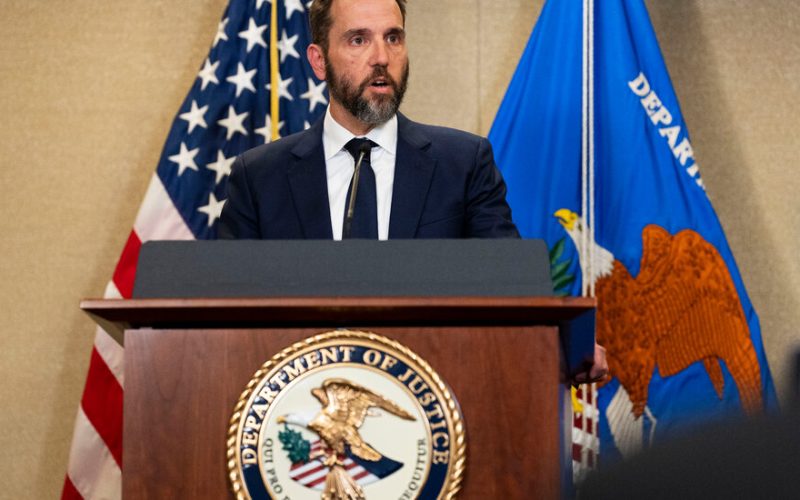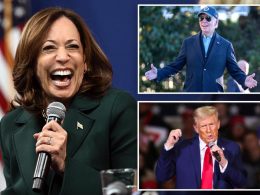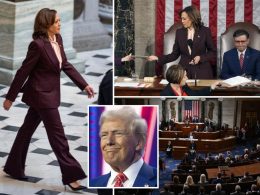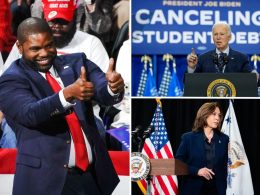A federal judge in Florida put off making a ruling on Friday about whether the Justice Department can give members of Congress a report by the special counsel, Jack Smith, detailing his findings in the criminal case accusing President-elect Donald J. Trump of mishandling classified documents.
The decision by the judge, Aileen M. Cannon, to hold off issuing a ruling raised the possibility that any efforts to share that part of Mr. Smith’s report outside of the Justice Department would be postponed until after Mr. Trump re-enters the White House on Monday. At that point, he and his officials would have the power to keep the report from seeing the light of day.
Judge Cannon’s decision not to issue an immediate ruling came at the conclusion of a hearing in Federal District Court in Fort Pierce, Fla., where prosecutors and defense lawyers argued about the Justice Department’s plan to release the volume not to the public, but to the four leaders of the House and Senate Judiciary Committees.
Attorney General Merrick B. Garland has said that the classified documents section of the two-volume report should not be made public at the moment because an appeal in that proceeding remains active as to Mr. Trump’s two co-defendants in the case and that any release of new information could be prejudicial to them.
But Mr. Trump’s lawyers and lawyers for the co-defendants took issue with Mr. Garland’s plan, arguing that giving the volume to Congress would only encourage lawmakers to leak it or talk about it in open session. The lawyers were concerned about public discussion of the report because they claim the volume contains “false and derogatory” information that Mr. Trump’s congressional adversaries could use to undermine his transition “and his ability to govern our nation moving forward.”
Judge Cannon, who was appointed by Mr. Trump, asked the government at one point why there was “such urgency to release” the report to Congress now, adding, “I am still not hearing a satisfactory answer to that question.”
Elizabeth Shapiro, one of the prosecutors, said that Mr. Garland’s remaining time in office was limited and that he wanted to see the release of the report “satisfied during his tenure.”
It remains unclear what specific revelations the volume contains because the document itself has never been made public and some of the discussions about it in court on Friday were conducted under seal. Still, court papers have left hints about what sorts of disclosures could in theory be in the report.
More than a year ago — well before Judge Cannon dismissed the classified documents case in its entirety — Mr. Smith said in a filing that he planned to prove at trial why Mr. Trump had removed a trove of highly sensitive state secrets from the White House in 2021 and what he intended by retaining them. Because the case never went in front of a jury, prosecutors have never publicly addressed head-on the question of Mr. Trump’s motives — although they could do so in Mr. Smith’s report.
Moreover, Mr. Trump’s lawyers have complained, in a vague but vocal way, that the report implicates some “anticipated” members of his incoming administration. That could be a reference to witnesses like Kash Patel, Mr. Trump’s pick to lead the F.B.I., who was forced to testify to a grand jury in the documents case after he sought to avoid appearing by asserting his Fifth Amendment right against self-incrimination.
The dispute about the classified documents report is one of the final fights still remaining from the two criminal cases that Mr. Smith, who stepped down as special counsel last week, filed against Mr. Trump in 2023. Aside from the classified documents indictment that Judge Cannon oversaw in Florida, the special counsel also filed a separate indictment in Washington, charging Mr. Trump with plotting to overturn his loss in the 2020 election.
But after Mr. Trump won the 2024 election, Mr. Smith was forced to drop all of the charges against him under a binding Justice Department policy that prohibits pursuing criminal prosecutions against a sitting president. Under a different Justice Department regulation, Mr. Smith was also required, at the completion of his work, to submit a final report about the two cases to Mr. Garland.
Last week, Mr. Garland released the volume of the report that Mr. Smith wrote about the election interference case in Washington. That volume said, among other things, that Mr. Smith was confident Mr. Trump would have been found guilty of the charges if the case had gone to trial.
Judge Cannon could profoundly affect the future of the classified documents volume simply by avoiding any decision until after Inauguration Day. At that point, Mr. Trump would have control of the Justice Department and could pardon his two co-defendants, Walt Nauta and Carlos De Oliveira, or simply order the case against them to be dropped.
He could also have officials in his Justice Department sit on the report and never release it to anyone.
If Judge Cannon does allow decisions about the sole remaining — and perhaps most damaging — part of Mr. Smith’s report to drift into next week, it would follow a pattern she took throughout the classified documents case.
Over and over, Judge Cannon granted a serious hearing to far-fetched issues that Mr. Trump’s lawyers raised in his defense. Her willingness to consider such arguments, which many jurists would have disposed of out of hand, resulted in long delays in the case and ultimately led to her dismissing the charges altogether.








